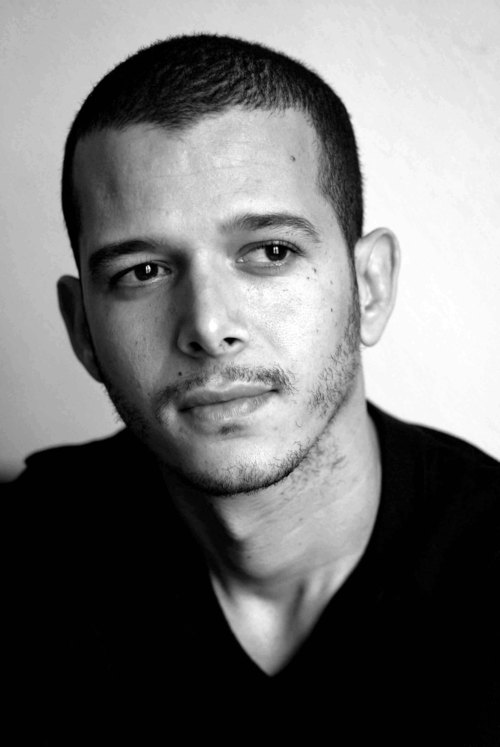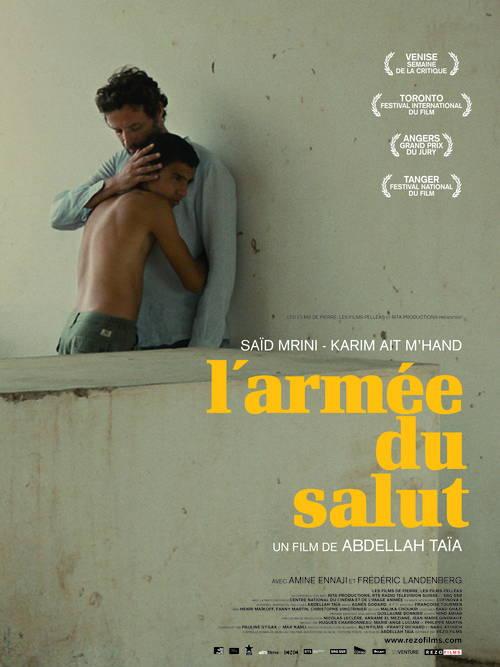
An Interview with Writer and Filmmaker Abdellah Taïa
Born in Salé, Abdellah Taïa was the first Moroccan author to come out as homosexual. He moved to Paris in 1998 and published his first book, Mon Maroc, two years later. His novels depict social, economic, and sexual hierarchies by describing human relationships and emotions. A few of his books include, Lu Jour du Roi (The King’s Day),An Arab Melancholia, and the autobiographical novel Salvation Army, published in English in 2009, with a preface by Edmund White, and was made into a film, directed by Taïa.
Abdellah Taïa and I spoke at his sparsely furnished apartment in the Marais, Paris, where we sat at a huge table. The writer and filmmaker poured me a cup of green tea that had, lettered onto the yellow mug, the words Miami Beach.
—Rebecka Bülow
I. THE CONTROL ISN’T IDEOLOGICAL BUT PHYSICAL
THE BELIEVER: What is your position today in Morocco?
ABDELLAH TAÏA: My books are published and known—especially the second one, Le Rouge du Tarbouche [The Red of the Fez]. After I wrote that book I started to write and talk about homosexuality. And since then, rich and powerful families—and even some writers and intellectuals—won’t officially accept me, because it would mean that they’re alright with homosexuality. But their support and blessing isn’t important to me. So many people and institutions are against homosexuals that, as a homosexual, you can’t waste your time by trying to convince them that you’re a good person. I understood that by the time I was twelve or thirteen.
There are also a lot of people in Morocco who support me. I’ve lectured in bookshops and I’m tolerated, maybe because of the fact that I’m published in Paris and in French. There is a little prestige in that, which gives protection.
BLVR: How was it to grow up as a gay person in Morocco?
AT: As a homosexual in Morocco I think that you understand very early that there’s no protection and that no one will defend you. If someone takes your arm and wants to have sex with you, it’s a kind of rape, but you can’t scream or tell you parents because they’ll just say that it was your own fault. They can’t even talk about homosexuality, that would mean that they’ve already thought about it.
Any gay person understands at some point that he or she has to disappear, to become invisible. That’s very difficult. You somehow have to kill yourself. This is asked of people who haven’t got the tools to understand that it’s all a social construction, and that they shouldn’t inferiorize themselves. This is asked of little kids. But I still live in the same outcome, and I’ll be forty-one in two days.
Once I began to talk openly again, people told me to shut up. After I published my second book, my brother told me that it was time to write fiction. The control isn’t ideological but physical. Someone is always there to keep you in your position.
BLVR: When I was in Morocco earlier this year I was struck by the constant presence of the monarchy. I saw the king’s portrait everywhere. The prosperity was a stark contrast to the people who struggled just to eat.
AT: For me, Le jour du roi investigates the relationship between someone with power, who is both very real and something beyond real, and the people who live in submission without even giving themselves the right to question their situation. The king has all kinds of power in Morocco, he’s the biggest star, he’s everything.
BLVR: I also live in a monarchy, Sweden, but the Swedish people don’t have the same kind of emotional relationship to the king.
AT: Well, I wouldn’t say that everyone in Morocco has a strong emotional relationship to the king. Already during Hassan II’s regime, in 1956, some people from the left wing were fighting for human rights. But when Hassan II won, and he managed to erase any possibility of rights from the minds of Moroccans.
All this had already happened when I was born. I wasn’t even aware that there had already been Moroccans fighting against the king. It took many, many years for me to realize that. I was living in the state of mind that I depict in the book—a dream about the king. His power was there all the time, everyday. To describe that state of mind is maybe the right way to discuss dictatorship. To explain how the the dictator enters into everything: in your mind, under your skin. And you don’t even think about questioning it.
During the Arab Spring there was the 20 February Movement. It didn’t change much, but it did spread the idea of questioning the system, and that’s a huge thing.

II. SOMETHING PRIMAL AND MYTHIC
BLVR: Omar and Khalid in Le Jour du Roi have a place where they can go together, an abstract place beyond set social structures. In front of each other they don’t have to disappear.
AT: There is a mystical thing between them, a place they invent, where no one else can be. We can call the place love, friendship, sexual attraction, or a pact. However, the reality of the society is also present. Their backgrounds, the social war they live in, what possibilities a person has or hasn’t got—all of that is present in their relationship.
After I’d established the structures they live in, I had to move them into a rebellion against those structures. But they’re not aware of it as a political act. Now, as an adult, I’m aware that I’m a political subject, but the book has to stay in the mind of these fourteen and fifteen-year-old boys. I couldn’t impose political ideas that I didn’t understand until I was twenty-six or twenty-seven. I didn’t want them to think like I do about homosexuality. I wanted them to put them into an area of ambiguity, where they act without labeling anything.
I hate to express political ideas directly in a book. I don’t want my books to be seen as an expression of this or that political idea. At the same time I want to show a kind of rebellion and transgression, something further.
That’s why the second part of the novel takes place in the woods. It was very important for me to take Omar and Khalid to a place where they can move and change. The story, or model, I had in my mind was Cain and Abel. I wanted to take Omar and Khalid somewhere primal and mythic.
BLVR: All the books I’ve read by you are about something primal—sex, fighting, love, freedom, and control.
AT: It’s comes naturally for me to write about what’s physical and outside of civilization. I think it comes from the poverty I grew up in. We were nothing and we had nothing, except for TV and Egyptian films. We were told we would become nothing. So I’ve always suffered from that nothing, and that nothing is what I express in my books.
My family spent many years sleeping side by side in the same room. It’s important for me to not separate myself from them or to say that I’ve suffered more than they have because I’m gay. We all suffered from the same political rejection, and from poverty. When you’re starving with eleven other people in the same room, you become connected to them forever. We were all hungry at the same time.
Everyone hasn’t got the power to free oneself and go away to another place or country. It’s not their fault; it’s a political thing. This has nothing to do with being gay or not. No one is capable of freeing oneself from society.
BLVR: Was it when you lived like this that you understood the sexual hierarchies and how strongly they affect everything? You often write about the sexuality of parents.
AT: Here, people often see sex just as sex, not as something that permeates everything. For me it’s something that I lived in, that is primal, and that is beautiful to me, I didn’t even ask myself if I should put it in the book—it just came out. People think that I only write about homosexuality, but that’s not true.
BLVR: Are you annoyed that media always labels you “the gay author”?
AT: I don’t see it as a limitation. If people still want to see it that way it’s their problem. It’s also important for me—because I come from a place where homosexuals have no rights, where it’s still a crime—that I speak freely about it, with no ambiguity.
[youtube https://www.youtube.com/watch?v=07aZ3rjX3Qw]
III. THE SAME PLACE
BLVR: Why do you write in French? When I was in Morocco, French didn’t seem to be spoken much. It was an upper class thing.
AT: Many Europeans think that all Moroccans speak French, but no. I had to make an effort to learn it when I studied French literature at the university in Rabat.
I started to write because of my dream to become a filmmaker. I got to know about a film school in Paris and it was my goal to get there. To do that I knew I had to learn French. In order to practice I started to write journals in French. The effort I made to master what I regarded a bad thing—a language owned by the rich Moroccans—brought me the ability to write.
BLVR: You’ve made one film but you continue to write books. Do you want to work more with cinema?
AT: Writing and making films aren’t different things to me. Or maybe it has become so, now. Making film is a very long process and you have to be physically strong. The literary work is more mystical, because it’s only the writer, and connected to something inside. Anyway, the imagery that becomes my books and film comes from the same place: the room in Salvation Army where the family watches the television. From that room, I’ve developed my perspective on the world.
BLVR: I guess that this also has to be your perspective on Paris, then. How have you explored French culture and literature?
AT: I came with an idea that the art and culture in Paris is big culture. I was just impressed and didn’t have a relationship with it. But my way of seeing French culture has changed. For instance, now I’m reading the biography of Flaubert. We studied Flaubert at the university in Morocco but I can’t remember that it touched me. Last week I started to read this book, and I totally found in myself in Flaubert, in his melancholy, his desperation, his dark humor. Now I want to read everything by Flaubert.
BLVR: I find An Arabic Melancholia to be a sensitive portrait of Paris.
AT: Really? It’s such a sad portrait. When I first moved to Paris I didn’t want to see the racism here. All that mattered was that I was in Paris. Now I’ve become aware of the different social classes and where I am in the structure, as an immigrant. I don’t say that they’re all racist here, but for instance, when someone says “Ah, you speak good French”, it also means that other people like me don’t speak good French, but that I’m accepted maybe because I do and because I can talk about Flaubert.
I want to stay here. This city accepts people like me doing what it is that I do, and that’s very important. My country didn’t give me that possibility.
//player.vimeo.com/video/91269796
FA L’ARMEE DU SALUT from Rezo Films on Vimeo.




